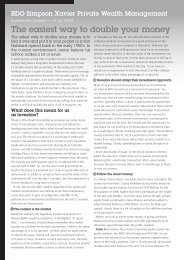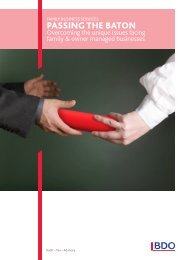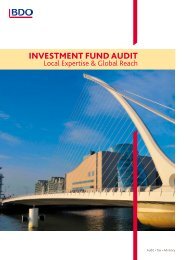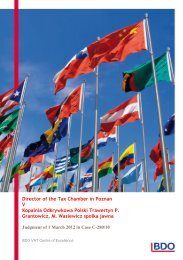You also want an ePaper? Increase the reach of your titles
YUMPU automatically turns print PDFs into web optimized ePapers that Google loves.
tax<br />
<strong>Finance</strong> Act<br />
<strong>2010</strong>
2<br />
<strong>Finance</strong> Act <strong>2010</strong><br />
Contents<br />
Key issues for individuals<br />
Key issues for businesses<br />
Financial services<br />
Property<br />
Value added tax<br />
Other points to note<br />
Key issues for individuals<br />
Domicile levy<br />
As announced in the December Budget, the <strong>act</strong> introduces an annual<br />
domicile levy, which is effective from 1 January <strong>2010</strong>.<br />
The Domicile levy applies to an individual who is Irish domiciled and a<br />
citizen of Ireland who has:<br />
– Worldwide income exceeding €1,000,000,<br />
– a liability to Irish income tax in the relevant year less than €200,000<br />
and,<br />
– Irish property with a valuation in excess of €5,000,000 as at 31st<br />
December in the relevant year. In estimating the value of the asset,<br />
no deduction is allowed for debts or encumbrances.<br />
Irish property is broadly defined for the purposes of this section to cover<br />
rights and interests of every description. It also includes Irish property<br />
which the individual has transferred to his/her spouse or minor children<br />
for less than market value after 18 February <strong>2010</strong>.<br />
Assets that are specifically excluded from the definition of Irish property<br />
are shares in a company which exists wholly or mainly to carry out a<br />
trade or a holding company that derives most of its value from trading<br />
subsidiaries.<br />
Shares in foreign corporate entities may also come within the definition<br />
of Irish property if the shares derive the greater part of their value from<br />
Irish situate assets, namely land or buildings in the State.<br />
An individual subject to the domicile levy is entitled to a credit against<br />
the levy for Irish income tax already paid in the relevant year.<br />
The Domicile levy applies irrespective of the individual’s tax residence<br />
status and is payable on a self assessment basis.<br />
Remittance basis of taxation<br />
With effect from 1 January <strong>2010</strong>, the remittance basis of taxation<br />
related to foreign income will now only apply to individuals who are not<br />
domiciled in Ireland.<br />
This amendment will affect Irish citizens taking up residency in Ireland<br />
after a period of time abroad. Prior to this proposed amendment, Irish<br />
individuals who were not ordinarily resident (i.e. not tax resident for three<br />
consecutive years in Ireland) were only taxable on Irish source income<br />
and foreign income to the extent it was remitted during the first three<br />
years of their residency.<br />
Non-Irish domiciled individuals will continue to avail of the remittance<br />
basis of taxation in respect of both foreign income and foreign capital gains.<br />
These individuals will now be taxed on their worldwide income from the<br />
first year they become Irish tax resident.<br />
Relief for foreign employees<br />
Prior to 1 January 2006 non-domiciled and non-ordinarily resident<br />
individuals could avail of the remittance basis of taxation to include<br />
income from a foreign employment that is exercised in Ireland. However,<br />
the remittance basis of taxation in respect of foreign employment income<br />
was removed from 1 January 2006.<br />
In 2008 a limited form of remittance basis was introduced in respect of<br />
employment income subject to certain conditions being met.<br />
The relief enables an individual to claim a refund of PAYE on earnings to<br />
the greater of employment income received in or remitted to Ireland and<br />
an amount equal to €100,000 plus 50% of this employment income in<br />
excess of €100,000.<br />
The conditions to avail of this relief were as follows:<br />
– Individual was tax resident but not domiciled in Ireland.<br />
– Prior to becoming resident in Ireland, the individual was resident in a<br />
non-EEA state with which Ireland had a double taxation treaty.<br />
– The employment duties were exercised in Ireland for at least 3 years,<br />
and,<br />
– while exercising these duties the employee was being paid from<br />
abroad.<br />
The <strong>2010</strong> <strong>Finance</strong> Act relaxes these conditions so that it can now apply to<br />
employees who were resident in EEA states prior to taking up residency in<br />
Ireland. In addition, the requirement for the Irish employment to be for at<br />
least 3 years has been reduced to 1 year.
<strong>BDO</strong> tax department 3<br />
Service charges<br />
Income tax relief for service charges will not be available for charges<br />
incurred from 2011 onwards. As relief for service charges is granted one<br />
year in arrears, an individual will be able to claim relief in 2011 for charges<br />
paid in <strong>2010</strong>.<br />
Rental income<br />
The <strong>act</strong> introduces an amendment to clarify the priority for offset of<br />
rental losses and capital allowances in computing taxable rental income.<br />
The <strong>act</strong> states that rental capital allowances arising in the current year<br />
are to be deducted against rental income in priority to rental losses that<br />
have been carried forward from a prior year.<br />
Rent a room relief<br />
The rent a room relief scheme affords relief in respect of rental income<br />
arising from Irish residential property that is occupied by the landlord as<br />
his principal private residence.<br />
The <strong>act</strong> amends the relevant section to preclude the claiming of this<br />
exemption if the individual receiving the rent is an employee or office<br />
holder of the person making the payment.<br />
Share schemes – employer reporting requirements<br />
The <strong>act</strong> introduces a mandatory reporting requirement for employers<br />
who award shares to employees. Prior to this amendment there was<br />
only a reporting requirement for share options (form SO2) and certain<br />
specified share schemes.<br />
The filing requirements are in line with the form SO2 in that a return<br />
must be filed with Revenue by 31st March following the year in which the<br />
shares are awarded.<br />
Restricted share scheme<br />
Legislation relating to restricted share schemes provides for abatement<br />
from income tax on shares, subject to a restriction on sale.<br />
The key benefit of this scheme is that an individual can claim an<br />
abatement of up to 60% of the taxable value of the shares, subject to the<br />
form of the restrictions on sale. One of the requirements of the scheme is<br />
that the shares under restriction are held in a trust company. The <strong>Finance</strong><br />
Act provides that this trust entity must now be established in a country<br />
within the EEA and that the trustees must also be resident in an EEA<br />
State.<br />
1 January <strong>2010</strong> and 31 December 2011, until the end of 2017. For loans<br />
taken out in 2012, mortgage interest relief will be available at a reduced<br />
rate of 15% with a ceiling of €6,000/€3,000 married/single for firsttime<br />
buyers and a reduced rate of 10% with a ceiling of €6,000/€3,000<br />
married/single for non first-time buyers. Loans taken out on or after 1<br />
January 2013 will not qualify for mortgage interest relief and mortgage<br />
interest relief will be abolished completely for the tax year 2018 and<br />
subsequent tax years.<br />
Share buyback by quoted companies<br />
This is an anti-avoidance measure which removes the entitlement,<br />
subject to certain conditions, to capital gains tax treatment for the<br />
shareholder on a redemption, repayment or repurchase of their shares by<br />
the quoted company.<br />
The proposed amendment will apply income tax to such a payment if<br />
it forms part of a scheme or arrangement, the main purpose of which<br />
is to enable the owner of the shares to participate in the profits of the<br />
company (or its subsidiaries) without receiving a dividend.<br />
In addition, quoted companies will also be required to notify the Revenue<br />
Commissioners of any redemption, repayment or repurchase of its own<br />
shares on or after 4th February <strong>2010</strong>.<br />
This measure does not extend to private companies.<br />
Retirement relief<br />
This section grants relief from capital gains tax in the case of an individual<br />
aged 55 or over on a disposal of all or part of their chargeable business<br />
assets or shares in their family company where the consideration is less<br />
than €750,000.<br />
The <strong>Finance</strong> Act amends the provisions and provides that retirement relief<br />
and the €750,000 cap above will apply, subject to all other conditions<br />
being met, to a situation where an individual receives a payment from a<br />
family company on the redemption, repayment or purchase of its own<br />
shares on or after 4 February <strong>2010</strong>.<br />
Relief for charitable donations<br />
The <strong>act</strong> extends relief available in respect of Charitable Donations to<br />
qualifying charities established in other EEA and EFTA States. In order to<br />
qualify the foreign charity must apply to the Revenue Commissioners for<br />
a determination that it qualifies for charitable purposes.<br />
This amendment applies to shares acquired on or after 4 February <strong>2010</strong>.<br />
High earners restriction<br />
The <strong>act</strong> increases the effective income tax rate for high-income earners<br />
from 20% to 30% with effect from 1st January <strong>2010</strong>.<br />
The adjusted income threshold at which the restriction will begin to<br />
operate has been reduced from €250,000 to €125,000. The adjusted<br />
income threshold at which the full restriction will apply has been reduced<br />
from €500,000 to €400,000.<br />
The formula for calculating the restriction is amended so that reliefs<br />
allowed are limited to the greater of €80,000 (previously €125k) and<br />
20% (previously 50%) of the individuals adjusted income for the tax year.<br />
Mortgage interest relief<br />
The <strong>act</strong> extends mortgage interest relief to the end of 2017 for those<br />
whose entitlement was due to end in <strong>2010</strong> or later.<br />
The relief will be available at current levels for loans taken out between
4<br />
<strong>Finance</strong> Act <strong>2010</strong><br />
Key issues for business<br />
Transfer pricing<br />
The <strong>Finance</strong> Act introduces general transfer pricing legislation which is<br />
intended to consolidate and expand on existing legislation and to align<br />
Ireland with international standards by adopting the OECD arms length<br />
principles.<br />
The provisions apply to cross-border and domestic trans<strong>act</strong>ions and<br />
will generally apply to any trans<strong>act</strong>ion between associated enterprises<br />
involving services, goods, money or intangible assets. The provisions will<br />
apply where Irish trading receipts are understated or trading expenses are<br />
overstated.<br />
The legislation has been introduced for chargeable periods commencing<br />
on or after 1 January 2011. The regime will not apply to contr<strong>act</strong>s or terms<br />
and conditions agreed before 1 July <strong>2010</strong>. Any new arrangements or<br />
amendments to existing arrangements after this date will be within the<br />
scope of the new regulations.<br />
Small and medium enterprises (broadly defined as enterprises with less<br />
than 250 employees and either a turnover of less than €50m or assets<br />
of less than €43m on a global consolidation basis) are excluded from the<br />
scope of this legislation.<br />
The larger companies to whom transfer pricing will apply must maintain<br />
sufficient documentation to show compliance and must ensure that this<br />
documentation is available on request. It is understood that Revenue will<br />
issue guidelines to further clarify how the system is to operate.<br />
Research & developments tax credit<br />
The <strong>Finance</strong> Act provides a number of amendments aimed at enhancing<br />
the Research and Development Credit Regime. Unfortunately, the<br />
amendments will only be beneficial in very limited circumstances.<br />
The amendments introduce the concept of a research and development<br />
centre which means a fixed base, established in a building or structure,<br />
which is used for the purpose of the carrying on by a company of<br />
research and development <strong>act</strong>ivities. This definition becomes relevant<br />
when calculating the threshold amount (2003 base year spend).<br />
Where research and development <strong>act</strong>ivities are carried on by a group of<br />
companies in separate geographical areas (research and development<br />
centres located more than 20 km apart) and the research and<br />
development <strong>act</strong>ivities in one of these areas is discontinued, the 2003<br />
expenditure in relation to research and development <strong>act</strong>ivities of this<br />
centre is excluded when calculating the threshold amount.<br />
However, the amendments include a clawback procedure where one of<br />
the following arise:<br />
– the centre is used by another company for the purpose of its trade,<br />
– the research and development <strong>act</strong>ivities that were carried on in<br />
the research and development centre in the 4 years prior to the<br />
cessation are subsequently carried on by another group company, or<br />
– if no company within the group is within the charge to Irish<br />
corporation tax within the 10 year period following the cessation of<br />
the <strong>act</strong>ivities.<br />
Any amount clawed back will be charged to tax at the higher rate of 25%.<br />
The amendments also provide clarity in situations where research and<br />
development <strong>act</strong>ivities are carried out in the pre-trading period. It is now<br />
clear that the expenditure shall be treated as if it was incurred in the<br />
accounting period in which the company commenced to trade and the<br />
claim for the credit in relation to this expenditure must be made within<br />
12 months of the end of this accounting period.<br />
The <strong>act</strong> also provides that the Collector General will firstly apply any<br />
research and development refunds due against any other tax liabilities of<br />
the company. The Collector General will also withhold the refund if there<br />
are any outstanding returns for the company.<br />
As stated above the enhancements to the regime will only apply in<br />
limited circumstances and therefore, will not have any major imp<strong>act</strong><br />
on attr<strong>act</strong>ing investment in research and development. Also, it is very<br />
disappointing that the changes proposed by the Commission on Tax in<br />
relation to the manner in which the credit is refunded to the companies<br />
has not been implemented. The proposal would have meant that<br />
companies could have recorded the credit above the line against payroll<br />
costs. This would have resulted in no cost to the exchequer but would<br />
have been very beneficial in encouraging foreign investment in Irish<br />
research and development.<br />
The above changes take effect for accounting periods beginning on or<br />
after 1 January <strong>2010</strong>.<br />
Intellectual property<br />
The <strong>Finance</strong> Act further enhances the Intellectual Property Regime that<br />
was introduced by <strong>Finance</strong> Act 2009.<br />
The <strong>act</strong> extends the list of specified intangible assets that qualify for<br />
the regime to applications for the grant and registration of some of the<br />
existing specified intangible assets.<br />
The <strong>act</strong> also clarifies that where the allowances are claimed in line with<br />
the amounts written off to the profit and loss account in accordance with<br />
accounting principles, relief will also be available for any impairment that<br />
is charged to the profit and loss account.<br />
Previously, where capital allowances were claimed on specified intangible<br />
assets, the specified intangible asset must be a qualifying asset for the<br />
period of 15 years from when the asset was first used in order to avoid<br />
a clawback of allowances claimed. The Bill now provides that where the<br />
asset ceases to qualify after a 10 year period no clawback will arise.<br />
Computer software now needs to be classified between software that<br />
is used by the company for the purpose of commercial exploitation and<br />
software that is used in an end user capacity. Where software is used for<br />
commercial exploitation the new regime must apply and relief is given<br />
either as the expenditure is written off to the profit and loss account or<br />
over 15 years. Where the company uses the software as an end user then<br />
expenditure is still written off over 8 years.<br />
The <strong>act</strong> introduces amendments aimed at ensuring that relief will be<br />
available on expenditure incurred on the provision of specified intangible<br />
assets prior to commencement of trade.<br />
Finally the <strong>act</strong> provides clarifications in relation to the separate trading<br />
<strong>act</strong>ivities on the exploitation, management and development of specified<br />
intangible assets.<br />
The new provisions apply to relevant expenditure incurred after 4<br />
February <strong>2010</strong>.<br />
Capital allowances for certain energy-efficient equipment:<br />
The <strong>Finance</strong> Act extends the incentive to purchase certain types of energy<br />
efficient equipment. The categories have now been expanded from seven<br />
to ten. The three additional categories are:<br />
– Refrigeration and cooling systems<br />
– Electro-mechanical systems<br />
– Catering and hospitality equipment
<strong>BDO</strong> tax department 5<br />
Companies can now claim 100% capital allowances on the purchase of<br />
these items.<br />
Tax relief for start-up companies<br />
Section 31 of <strong>Finance</strong> (No.2) Act 2008 provided for the introduction of<br />
a three-year exemption from taxation for certain start-up companies<br />
commencing to trade on or after 1 January 2009.<br />
In summary, to the extent the tax liability does not exceed €40,000 per<br />
annum (i.e. the relief will shelter trading profits of up to €320,000 per<br />
annum, using the current standard trading corporate tax rate of 12.5%)<br />
the relief applies, companies will be exempt from corporation tax and<br />
capital gains tax in each of the first three years. Marginal relief may apply<br />
where the tax liability is between €40,000 and €60,000 per annum.<br />
Among the conditions to be satisfied in order to qualify for the<br />
exemption:<br />
– The company must be incorporated on or after 14 October 2008.<br />
– The company must commence to trade during 2009 or <strong>2010</strong>.<br />
– The trade must be a new trade.<br />
– Professional services companies cannot qualify for exemption.<br />
The existing scheme of tax exemption on the income and gains of new<br />
start-up companies over the first 3 years of operation has been extended<br />
to companies who commence to trade in <strong>2010</strong>.<br />
Dividend withholding tax (DWT)<br />
The <strong>Finance</strong> Act contained provisions removing the requirement for<br />
non-resident companies to provide a tax residence and/or auditors<br />
certificate in order to obtain exemption from DWT at source. Instead, the<br />
non-resident company will provide a declaration and certain information<br />
to the dividend paying company or intermediary to claim the exemption<br />
from the DWT. The declaration will be for a period of up to 6 years after<br />
which a new declaration must be provided for the DWT exemption to<br />
apply. This move to a self-assessment basis for operating DWT removes<br />
a significant administration burden for non-resident investors in Irish<br />
companies.<br />
countries with which Ireland has negotiated a tax treaty which is not yet<br />
in force. These provisions accelerate the date from which lenders in these<br />
new tax treaty jurisdictions can avail of relief from Irish withholding tax<br />
under Irish domestic relieving provisions.<br />
Under existing legislation, there was an exemption to a company resident<br />
in a relevant territory from income tax on interest payments made by an<br />
Irish company or investment undertaking in the course of business. There<br />
was also relief from withholding tax on these payments. The <strong>Finance</strong> Act<br />
amends the appropriate sections to ensure relief will only apply where<br />
the interest payment is liable to tax in the relevant territory.<br />
Foreign branches<br />
Where an Irish company has foreign branches it is generally taxable on<br />
the profits of the branches and a credit is available for the foreign tax<br />
suffered on those profits.<br />
The amendments in the <strong>Finance</strong> Act will now allow unused foreign<br />
tax credits in respect of branch profits to be carried forward against<br />
corporation tax in succeeding accounting periods. This essentially means<br />
that there will be similar treatment to the income from branches as to<br />
the income from foreign subsidiaries.<br />
Cross border mergers relief<br />
The disposal of assets by a company on which wear and tear allowances<br />
have been claimed or the ceasing of a trade, can trigger a clawback of<br />
allowances that were previously claimed.<br />
The <strong>Finance</strong> Act provides that a transfer of trade and assets in a cross<br />
border merger will not give rise to a balancing charge. The company<br />
acquiring the trade will step into the shoes of the transferor for capital<br />
allowance purposes. This change brings the Irish tax treatment of such<br />
disposals into line with the EU Mergers Directive and takes effect from 1<br />
January <strong>2010</strong>.<br />
Foreign dividends liable at 12.5%<br />
The scope for taxing foreign dividends at 12.5% has been extended to<br />
dividends paid out of the underlying trading profits of a company resident<br />
in a non-treaty country where the company is 75% owned directly or<br />
indirectly by a publicly quoted company.<br />
The provisions also included amendments to simplify the rules for<br />
identifying the underlying profits out of which the dividends are paid<br />
in order to determine the appropriate rate of tax in respect of those<br />
dividends.<br />
Unilateral relief / royalty income<br />
The <strong>Finance</strong> Act extends the unilateral credit relief in respect of<br />
withholding taxes on royalty income from non-treaty countries to all<br />
trading companies in respect of royalties received on or after 1 January<br />
<strong>2010</strong>.<br />
Royalty payments<br />
The <strong>Finance</strong> Act provides for an exemption from Irish withholding tax<br />
in respect of certain royalty payments paid to residents in the EU, other<br />
than in Ireland, or in a country with which Ireland has a tax treaty where<br />
the recipient is liable to tax in that territory in respect of the payment.<br />
Interest payments<br />
The <strong>Finance</strong> Act introduces changes to confirm that the withholding tax<br />
exemption is extended to interest paid to companies that are resident in
6<br />
<strong>Finance</strong> Act <strong>2010</strong><br />
Financial services<br />
Funds<br />
The <strong>Finance</strong> Act introduces legislation that is aimed at enhancing Ireland<br />
as a leading location for the management of UCIT funds from other EU<br />
Jurisdictions.<br />
UCITS IV allows a management company in one EU jurisdiction to offer<br />
certain investment <strong>act</strong>ivities to UCITS funds in other EU jurisdictions.<br />
The proposed changes include the protection of tax residency and<br />
tax exemption of any foreign UCITS that is to be managed by an Irish<br />
investment management company.<br />
The <strong>Finance</strong> Act also includes provisions aimed at allowing for the<br />
consolidation of investment funds on a tax effect basis. The compliance<br />
burden for non-Irish resident unit holders has also been reduced.<br />
Islamic finance<br />
Islamic finance covers any financing arrangement that is compliant with<br />
the principles of Shari’a law.<br />
The <strong>Finance</strong> Act contains provisions aimed at attr<strong>act</strong>ing the growing<br />
Islamic finance business to Ireland. Shari’a Law forbids the making or<br />
receiving of interest payments. Essentially the changes in the <strong>Finance</strong><br />
Act will facilitate Islamic financial trans<strong>act</strong>ions by extending to this<br />
form of finance the relieving provisions which currently apply to their<br />
conventional counterparts. The <strong>Finance</strong> Act also incorporates a stamp<br />
duty exemption for the issue, transfer or redemption of sukuk (i.e. Islamic<br />
bonds) and an exemption from VAT on specified financial trans<strong>act</strong>ions.<br />
Leasing<br />
Capital allowances:<br />
Current tax law enables a lessee to claim capital allowances on an asset<br />
where they bear the burden of wear and tear. Revenue has come across<br />
cases where both the lessor and lessee of an asset are getting the benefit<br />
of capital allowances on the same asset. The <strong>Finance</strong> Act amends this<br />
to ensure that capital allowances can only be claimed by one party on a<br />
particular asset.<br />
Short-life assets:<br />
Section 80A TCA 1997 which essentially allows for accelerated capital<br />
allowances for finance lessors of short-life assets (assets with a useful<br />
life of less than 8 years) has been extended to cover both finance leases<br />
and operating leases. This essentially means the lessor can choose to<br />
follow the accounting results for tax purposes i.e. get a tax deduction for<br />
its accounting depreciation and ignore the leasing adjustments for the<br />
capital and tax depreciation entries. The new measures include a group<br />
threshold designed to limit the treatment to new portfolios of assets.<br />
Property<br />
Termination of capital allowances for childcare facilities<br />
The <strong>Finance</strong> Act provides for the termination of the scheme of capital<br />
allowances in respect of expenditure incurred on the construction,<br />
conversion or refurbishment of buildings that are used for childcare<br />
purposes. The <strong>Finance</strong> Act provides for transitional measures for pipeline<br />
projects.<br />
The scheme, which was previously open-ended, now has a termination<br />
date of 30 September <strong>2010</strong>, unless certain qualifying conditions are met,<br />
in which case the termination date for qualifying expenditure on pipeline<br />
projects is extended. These qualifying conditions depend on the type of<br />
work to be carried out and whether or not the work requires planning<br />
permission.<br />
Where the work to be carried out does not require planning permission,<br />
the termination date is 31 March 2011 so long as at least 30% of the<br />
construction, conversion or refurbishment costs have been incurred on or<br />
before 30 September <strong>2010</strong>.<br />
Where planning permission is required in relation to the work to be<br />
carried out, the termination date for qualifying expenditure is 31 March<br />
2012 so long as a valid application for full planning permission is<br />
submitted on or before 30 September <strong>2010</strong>, and is acknowledged by the<br />
relevant planning authority.<br />
Windfall tax (NAMA Bill)<br />
The NAMA Act contained provision for an 80% tax on profits or gains<br />
from increases in land values due to rezoning/change of use.<br />
The <strong>Finance</strong> Act has amended the legislation so that sites of an acre or<br />
smaller are exempt from the tax if, at the time of disposal, the market<br />
value does not exceed €250,000 and the disposal does not form part<br />
of a larger trans<strong>act</strong>ion or series of trans<strong>act</strong>ions. This exemption applies<br />
retrospectively from 30 October 2009.<br />
The <strong>Finance</strong> Act has also brought within the windfall tax charge, uplifts in<br />
values that arise from a “material contravention” decision. A later date of<br />
4 February <strong>2010</strong> applies to this amendment.<br />
Relevant contr<strong>act</strong>s tax (RCT)<br />
There are some administrative changes in RCT which will enable the<br />
Revenue Commissioners issue a C2 Authorisation for a period of up<br />
to two years, a change from the current one year limit. There are also<br />
changes which would appear to permit the filing of RCT returns on a<br />
less frequent basis e.g. quarterly or six monthly at the discretion of the<br />
Revenue Commissioner.<br />
Foreign currency:<br />
Where a companies functional currency is a currency other than the<br />
Euro, Section 402 enables a company to compute its capital allowances<br />
and loss relief in that functional currency. This eliminates potential<br />
uncertainty arising from fluctuations in exchange rates. This only applied<br />
where a company was carrying on a “trade”. The <strong>Finance</strong> Act extends this<br />
facility to non-trading lessors who are currently taxed under Case IV.
<strong>BDO</strong> tax department 7<br />
Value added tax (VAT)<br />
While there were no unexpected provisions in the <strong>act</strong> the major changes<br />
imp<strong>act</strong> on motor dealers and local authorities.<br />
Motor dealers<br />
The changes see the introduction of a margin scheme for dealers in<br />
second hand vehicles. In simple terms this means that motor dealers will<br />
now have to account for VAT on the profit margin, assuming they achieve<br />
one, in respect of the sale of used cars. There are transitional measures<br />
and the Bill also provides motor dealers with a once off “windfall gain” for<br />
vehicles acquired by them in the first six months of <strong>2010</strong>.<br />
Local authorities<br />
The <strong>act</strong> also provides that certain <strong>act</strong>ivities of Local Authorities and<br />
other State bodies which are deemed not to be supplied in the public<br />
interest will be subject to VAT. The supplies in question are generally<br />
those in which the Local Authorities would be in competition with private<br />
operators such as waste collection, off-street parking etc and the changes<br />
were required following a decision by the European Court of Justice.<br />
Contrary to public perception the introduction of VAT could result in a<br />
reduction in cost for many VAT registered businesses. Based on the f<strong>act</strong><br />
that Local Authorities will now be entitled to recover VAT on related costs<br />
coupled with the underlying market conditions it is unlikely that the cost<br />
will rise significantly and most businesses will now be entitled to recover<br />
the VAT included in that cost.<br />
Other points to note<br />
The <strong>Finance</strong> Act ratifies a number of new double taxation agreements<br />
with Bahrain, Belarus, Bosnia & Herzegovina, Georgia, Moldova and<br />
Serbia.<br />
Revenue powers<br />
The <strong>Finance</strong> Act has inserted a new wide range of Revenue powers into<br />
legislation. The main powers are as follows:<br />
– The amount of PAYE credit claimed by proprietary directors cannot<br />
exceed the PAYE tax <strong>act</strong>ually deducted from his or her directorship<br />
emoluments.<br />
– Customs and Excise obligations have now been added to the list of<br />
taxes and duties that must be paid before Revenue can issue a Tax<br />
Clearance Certificate.<br />
– Revenue will now be enabled to get access to information from<br />
NAMA in relation to trans<strong>act</strong>ions in property to ensure that the<br />
trans<strong>act</strong>ions have been correctly dealt with by the parties concerned<br />
for tax and duty purposes.<br />
– Revenue will now have the authority to serve summons in cases<br />
where summonses and other such notices are returned un-served by<br />
the Gardaí.<br />
– Revenue will now be allowed to apply to the Appeal Commissioners<br />
for consent to issue a notice to obtain information from “third<br />
parties” in relation to a “class of persons” on the same basis that<br />
Revenue currently have for financial institutions.<br />
– Revenue now authorised to request information held by the<br />
Commission for Taxi Regulation.
This publication has been carefully prepared, but it has been written in general terms and<br />
should be seen as broad guidance only. The publication cannot be relied upon to cover specific<br />
situations and you should not <strong>act</strong>, or refrain from <strong>act</strong>ing, upon the information contained<br />
therein without obtaining specific professional advice. Please cont<strong>act</strong> <strong>BDO</strong> to discuss these<br />
matters in the context of your particular circumstances. <strong>BDO</strong>, its partners, employees and<br />
agents do not accept or assume any liability or duty of care for any loss arising from any <strong>act</strong>ion<br />
taken or not taken by anyone in reliance on the information in this publication or for any<br />
decision based on it.<br />
<strong>BDO</strong> is authorised by the Institute of Chartered Accountants in Ireland to carry on investment<br />
business.<br />
<strong>BDO</strong>, a partnership established under Irish Law, is a member of <strong>BDO</strong> International Limited,<br />
a UK company limited by guarantee, and forms part of the international <strong>BDO</strong> network of<br />
independent members firms.<br />
<strong>BDO</strong> is the brand name for the <strong>BDO</strong> International network and for each of the <strong>BDO</strong> Member<br />
Firms.<br />
© <strong>BDO</strong> <strong>2010</strong>




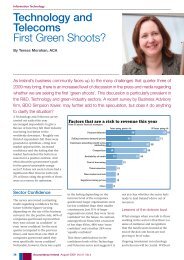



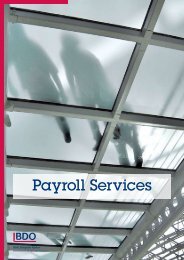
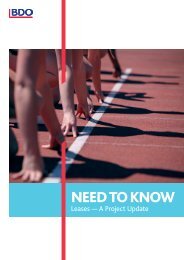
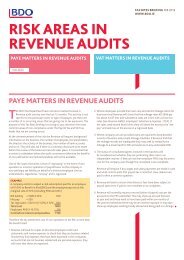
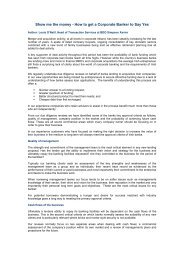
![eii 2013 a5 2pp flyer [web].pdf - BDO](https://img.yumpu.com/39595753/1/184x260/eii-2013-a5-2pp-flyer-webpdf-bdo.jpg?quality=85)
